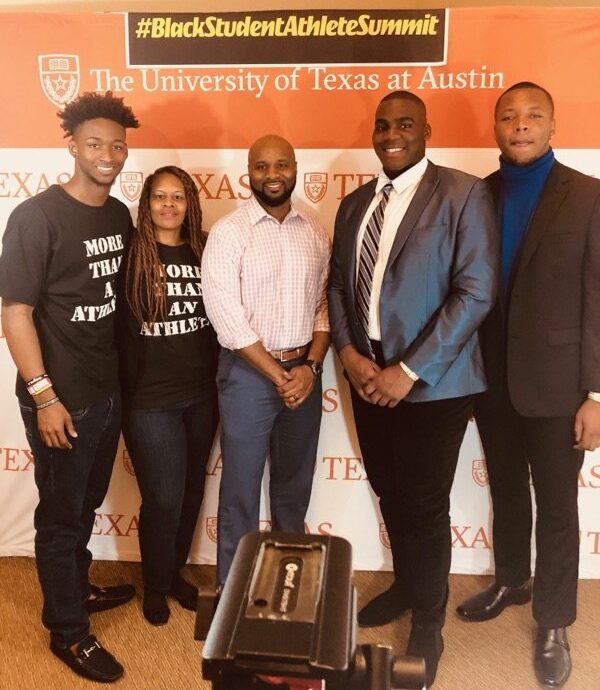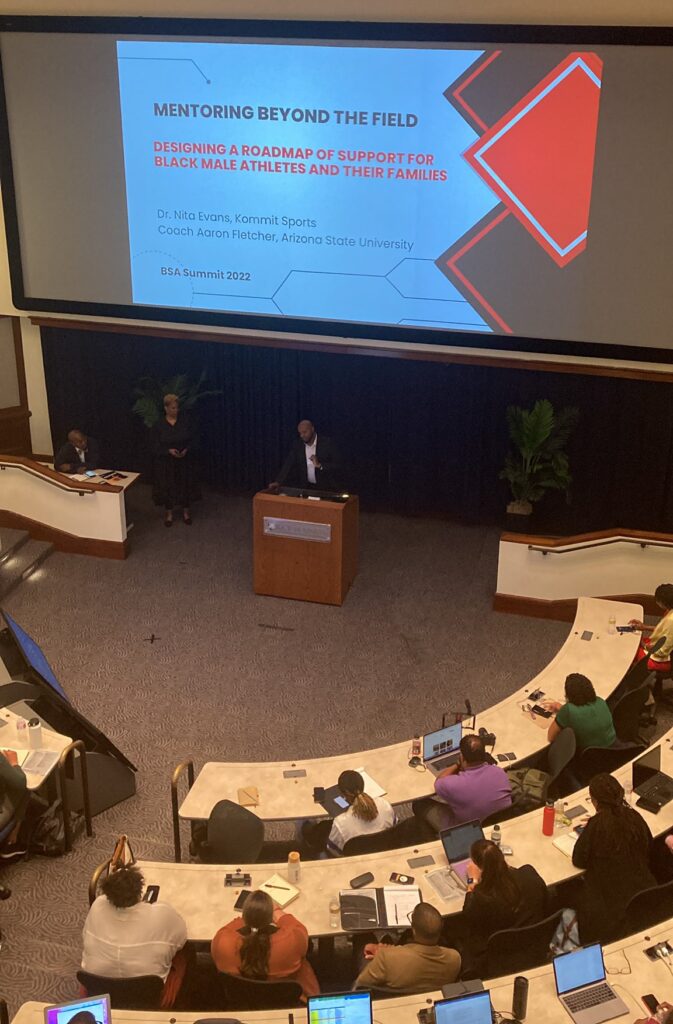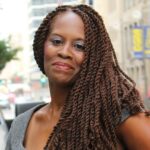
The Mira Fellowship is a six-month social impact fellowship for mid-career professionals focused on helping fellows create compassionate, actionable visions for the future. Through summits, coaching, cohort collaboration, up to $5,000 in research funding, and exclusive networking opportunities, the Mira Fellowship offers fellows the ability to jumpstart new projects to create a more compassionate world.
We interviewed Mira Fellow Dr. Nita Evans, who participated in the program in 2021. Dr. Evans has dedicated her career to issues of equity and access to higher education for students and families from marginalized communities. During her Mira Fellowship, she developed a turnaround plan to prepare Black athletes for college and address the longstanding graduation inequities in college sports to create upward mobility and success for Black males and their families. To learn more about her story, we asked Dr. Evans about her background, fellowship experience, and application tips for aspiring fellows.
Tell us about your background and professional journey. What led you to the Mira Fellowship?
With a PhD in Sociology, I spent most of my career as an academic and education activist. My work has primarily centered on equity and access to higher education for students and families from under-resourced communities. Top college football programs began recruiting my son during his junior year of high school. I saw firsthand the laser focus on his elite athleticism, with little concern about his college readiness or post-football career plans. In my research, I discovered that a pervasive problem exists system-wide whereby Black families are consistently duped into believing athletic programs are committed to their son’s outcomes, while the reality is that half of all athletes fail to complete their degree or graduate and are under-prepared for a career beyond sports.
This prompted me to begin asking questions such as: What are ways to improve graduation rates for Black athletes in revenue-generating sports? How do we create opportunities to help athletes find their unique path and plan? What if we invested in student support solutions that factored in the whole family? Where is the best place to begin to forge systems-level change?
It was these types of questions and my deep concern for the life outcomes of the thousands of young, Black males who see college as a gateway to professional sports—while knowing that 98% will not achieve this goal and will be left searching for alternative career options—that led me to the Mira Fellowship.
The Mira Fellowship is for proven doers who believe they know where the world should aim next. As a mid-career professional with a proven track record, an undying need to sink my teeth into this systemic problem, and the openness to reframe my assumptions and find a new solution, I knew this fellowship was ideal for me. What I hoped to get out of the fellowship was positive coaching, a supportive community, and an actionable plan I could easily implement but that would make an immediate impact.

What was the application process like?
I recall feeling that the Mira Fellowship was unlike any other I had applied for. I had seen plenty of fellowship applications before. This one was different. From the beginning, it was clear to me that I needed to be able to not only tell the story of what problem I wanted to solve but also be able to articulate why this issue should matter to the world. In addition, demonstrating why I was the best person to tackle the issue proved critical. As an academic, I initially made the mistake of treating the application like an intellectual exercise. As I listened to the stories of previous Mira Fellows, I quickly realized that this was more about my ability to design, reframe the issue, and use the Mira community as a resource to help me identify a practical solution to the problem I sought to address.
No one piece of the application was more important than another. I would say being detailed about the who, what, and why will help applicants tell the story of who they are, what they want to accomplish, and why the issue is important. Having a mindset that allows you to see the problem you want to tackle from a micro and macro perspective is also valuable. Being open to new ideas and new ways of problem-solving, especially collaboratively, was an asset.

Can you describe what a week in the life of a Mira Fellow is like?
The Mira Fellowship provides remote coaching support weekly or every other week depending on fellow needs; cohort meetings where we meet online monthly or bimonthly for check-ins, support, and brainstorms throughout the fellowship; cohort collaboration by being paired with another fellow to provide ongoing thought partnership and accountability; and summits where fellows gather for 2-3 days of learning, design, and reflection. Research funds are available to develop alternative perspectives and further immersion in one’s work.
A typical week for me consisted of meeting with the Mira coaches and checking in with my assigned Mira thought partner. One component I really enjoyed was that we were paired with different cohort members throughout the fellowship. This allowed us to experience diverse perspectives, which was such a rich opportunity. At first, it felt unusual to work on solving inequity in athletics and be paired with an environmental engineer. Yet, the fresh insight I received on looking at my project and reframing it was invaluable. I looked forward to the monthly cohort meetings as they allowed us to come together and draw feedback and support from one another. I never felt alone or isolated in the process. On the contrary, the Mira coaches and community created a safe space for me to develop and test my ideas, experiment rapidly, and lean into the iterative design thinking process. It helped me realize there was no right or wrong way to do the work; it was about consistently showing up weekly throughout the fellowship and being committed to developing my idea.
The Mira Fellowship has been a North Star for me. I was at a crossroads, personally and professionally, when I applied. I had amassed years of experience as an educator and had a fair amount of success in my career, yet remained unfilled. I knew there was more inside of me that I needed to get out and give to the world. I have always considered myself a changemaker. I was ready to leap into full-time change-making as a thought leader and founder. The Mira Fellowship provided me with the support and community of thinkers, innovators, and fellow changemakers to forge forward confidently in developing my project. Leaning into existing infrastructures, I have expanded and grown my professional network rapidly. I am excited to see the accelerated growth my project will experience in the next year.

The Mira Fellowship aims to help “create compassionate actionable visions for our future.” How has this vision influenced your work?
The world is in dire need of more compassion. To this end, it will take compassionate individuals to create compassionate, actionable visions for our future. No matter if it is climate change, rituals, and belonging, financial well-being, veterans leadership, gender equity, radical rest, or youth mentoring, these efforts make the world a better place for all. That is what the Mira Fellowship is about. It is the essence and embodiment of leading with compassion and urgency to improve the human condition, one idea at a time.
Every Mira Fellow comes to the table knowing that they are driven by the desire to make a positive contribution and impact in a meaningful way. With my years of being a sociology professor paired with my lived experience as a high school, college, and NFL mom, the Mira Fellowship helped me tell the story of how the image of success that is frequently presented to Black boys is the hope of one day being drafted as a professional athlete. A dream that is one-dimensional and riddled with pitfalls along the way. I was able to show how important it is for athletically gifted individuals who are chasing a pro dream to “catch an education” in the process.
My research during the fellowship led me to ask, what would happen if every Black male felt supported and knew college was his to take full advantage of? What if we ensured environments across the educational system supported their brilliance and excellence as individuals? What would happen if families were better equipped to strengthen their son’s readiness before, during, and after their playing career ends? What if the image of Black men as more than athletes was the norm instead of an idea? How can we begin to celebrate the success of Black men who go pro in sports and pro in entrepreneurship, education, healthcare, information technology, and other careers? I challenged myself to envision a world where every Black male who enters college with a ball in one hand leaves with a degree in the other.
What advice do you have for others interested in becoming Mira Fellows?
The best piece of advice I would give others interested in becoming a Mira Fellow is to know your why and be audaciously committed to executing your mission. Approach the process with confidence about your lived experience and the reason you are the one to tackle the problem. Another important piece of advice I would offer is to come open and prepared for the emotional journey that goes along with social change-making. Being a visionary is not light work, but it is rewarding work. In facing challenges, be intentional about having fun and enjoying the journey. The Mira Community spans the globe and finds unique and creative ways to keep their “Forever Fellows” connected and engaged. Once a Mira Fellow, always a Mira Fellow. Finally, I’d offer a reminder that the world is waiting for you to be the change it needs. If not you, then who?
Interested in other social change fellowships? Sign up to discover more than 2,700 professional and academic fellowships in the ProFellow database!

Dr. Nita Evans is an NFL mom, End Zone Equity consultant, and thought leader. She has a PhD in Sociology from Stony Brook University and is a subject matter expert on Black male achievement. A practitioner-scholar, Dr. Evans has dedicated her career to equity and access to higher education for students from under-resourced communities. She delivers presentations nationally to high school, college, and professional teams, athletes, and families to help them confidently and carefully navigate the academic, athletic, and life after sports landscape. Through her mentoring program, Kommit, she creates a community where athletes feel humanized, valued, and supported.
© 2024 ProFellow, LLC. All rights reserved.